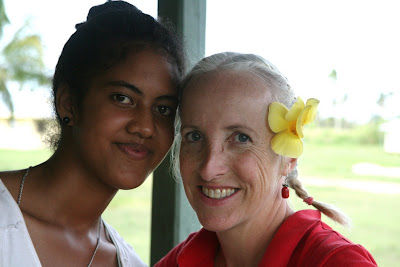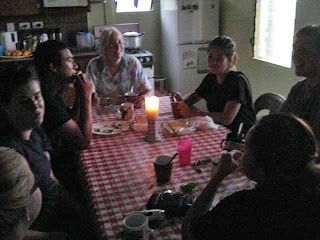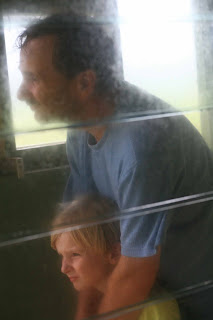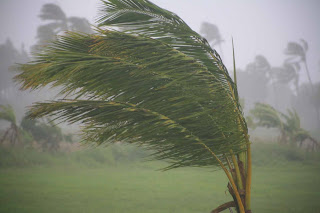




GIFTS, FREELY OFFERED
This was originally written by Kris on 2/10/10, and was edited with an amazing final gift at the end that was given our last day in Tonga, March 13, 2010.
“Freely, freely, you have received, freely, freely give. Go in my name and because you believe, others will know that I live.” This old hymn was on my mind today, and I hummed it as I cleaned up in the campus kitchen. It seems to have extra meaning now, as I ponder gifts and as I sit here in this south-pacific country where I’ve come to freely give away that which I have received (Christ’s love).
I’VE BEEN THINKING LATELY ABOUT GIFTS. It is a privilege to receive a gift from someone when there is no obligation or formal situation mandating such action. The best gifts are from the heart, spontaneous or carefully-planned, but given freely just because that person cares.
I got such a gift from my 4th grade son, Evan on my birthday two weeks ago. Well, it wasn’t a gift but a hand-made card. Dad didn’t tell him to make me a card, but he penned one with a green Overhead pen, front and back, with little pictures of each of our 4 heads and well wishes from Evan to Mommy. He hid it in the fridge on the birthday fudge the team had made for me here in Tonga. He figured for sure I’d come home and eat it, but I didn’t. It was a big night on this missionary base, as it was the kick-off evening for the new Discipleship Training School on this base. It was the biggest incoming class they’d had in 10 years. So, celebrating my birthday was a lower priority, and just didn’t happen (until the next day). Imagine my delight when I walked in the door around 10 p.m. to find that Evan had stayed awake, and ran to the fridge to give me my card. It was gold to me. I actually wept, as it was the first time in my 40+ years of living that I had not celebrated my birthday at all on my day. But he wouldn’t have that, and made sure of it with that little rather-messy green card. That was a priceless gift for this mom 23 hours ahead of her time-zone and home. Another gift for my birthday was lavished upon me by my new friend Jennie. An Australian teacher and mom whom I befriended the first week, she insisted on treating my family to a tour around the main island and an afternoon at a beach and supper for my birthday 48 hours before she was to fly home! (See photo of Jennie and her kiddos and our supper.)
Another gift was from my new friend Kerstin, a German woman on this base who also is a teacher. She offered to give me a back massage for my birthday, which I cashed in on a couple nights ago. She is excellent at these massages, as her masseuse aunt in Germany taught her many techniques. She comes over with a home-made concoction of coconut oil and hot chili peppers—kind of a tropical version of Icy Hot. When Kerstin walked in, though, she brought another gift for my husband. It was nicely-wrapped horseradish from a care package they’d received from Germany. I had mentioned that Randy loves horseradish, and she’d remembered and decided to go out of her way and give out of her way for his palate. What a treat! (Spending Valentines' evening at a resort for dinner with Kerstin and her husband, Karl, was also a gift! See photo.)
I had a few more gifts, freely given, today from locals. One teen-age gal on the base, Cindy, who is a nanny for the leaders, braided my hair in the French-braid style that the Tongan girls wear. She cheerfully did this, even though the dinner bell was ringing and she had kiddos to watch. We had some yard work that we needed done, and I was trying to find one of the guys to come over with his machete . A young man did come with a weed-eater, and took care of all of that growth and more for us. As I was picking up trash that was in our yard, I was called over by two of the new DTS students. “Want a drink?” Within seconds they’d taken their machete and made a green coconut into a lopped-off fresh drink for me. I ran inside, got a straw, and enjoyed the drink, like a tropical version of Gatorade. I glanced in the mirror at myself drinking this coconut milk with my new hair-style: gifts, freely-given. I was thankful.
Not to be forgotten was the mind-blowing gift given me by my Tongan friend, Kika. She had been going through some difficult times in her family, and we had had her over for prayer and encouragement. She also was the person we’d hired to do our laundry, and she did it quickly and so efficiently that the blouses sometimes looked like they’d just come from the department store rather than a two- gallon washing machine that you have to move the hose out to re-fill on the porch of her
fale (pronounced fal'lay).
Our last morning in Tonga, I was awakened by Kika at the door at 6:50. I could hear Randy saying, “Kris will want to see this; let me wake her!” I crawled out of bed…. to a shocking gift from Kika. “I couldn’t think of a gift for you, so I prayed, and this is what came to mind. Please take it!” It was her tapa cloth. (See photo of Tongan wedding with tapa cloth on wall behind.) This is a priceless tapestry that the women create over weeks and hand-down from generation to generation. Kika had received hers on her wedding day from her mother. It covers a whole wall, and is made from the bark of the Ironwood tree. There are black ink markings on it that represent things in Tonga, like the three dots representing the three old kings that all used to reign that island nation. I still cannot believe this newer friend gave me her tapa cloth! I transported it home in a loosely-bound carry-on bag. When it was time to declare what I was taking out of the country for customs, I could attach no dollar value to this sacred cloth. What a privilege and a remarkable gift, freely given!












 One of our favorite places to go for a family get-away is the Kohala Coast on this island--specifically, Pololu Valley. There are seven of these valleys that string together across the north face of the Big Island. It is very wet and windy here, much more than the sunny Kona side. The last of these valleys is the famous Waipio Valley, where we and thousands of others have hiked. But this one, called Pololu, is more remote and seemingly untouched. Just around the bend from the beach is an outcrop of rocks that Randy has captured a hint of in his beautiful photos. That is where some of the movie Jurassic Park was filmed. Enjoy with us, our descent into the valley that we took in mid-July with Evan's new friend from Tacoma, Parker Griffith and his family. We hiked down together, lost Randy for a couple hours while he tried to do justice to this beauty with his camera, and then the Richards re-convened for a family hike. We discovered stacked cairns of rocks, old marine ropes and rope-swings with to-die for views. You may get dizzy watching some of these photos. We hope your eyes are dazzled by the beauty, once again, of God's untouched creation.
One of our favorite places to go for a family get-away is the Kohala Coast on this island--specifically, Pololu Valley. There are seven of these valleys that string together across the north face of the Big Island. It is very wet and windy here, much more than the sunny Kona side. The last of these valleys is the famous Waipio Valley, where we and thousands of others have hiked. But this one, called Pololu, is more remote and seemingly untouched. Just around the bend from the beach is an outcrop of rocks that Randy has captured a hint of in his beautiful photos. That is where some of the movie Jurassic Park was filmed. Enjoy with us, our descent into the valley that we took in mid-July with Evan's new friend from Tacoma, Parker Griffith and his family. We hiked down together, lost Randy for a couple hours while he tried to do justice to this beauty with his camera, and then the Richards re-convened for a family hike. We discovered stacked cairns of rocks, old marine ropes and rope-swings with to-die for views. You may get dizzy watching some of these photos. We hope your eyes are dazzled by the beauty, once again, of God's untouched creation. 



























